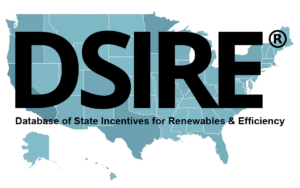Get to Know the Energy Policy & Markets Team Behind DSIRE at NCCETC
The Energy Policy & Markets team at the NC Clean Energy Technology Center (NCCETC) strives to advance clean energy technologies for a sustainable economy both locally and nationally. NCCETC’s Policy Team conducts objective research and analysis and provides education and technical assistance on energy policy issues nationwide. They work to track developments in energy policy and examine the impacts of these on clean energy technologies.
Why is this important to the clean energy industry?
Energy policy is the way the government addresses energy, encompassing laws, regulations, judicial opinions, incentives and strategic objectives at the federal, regional, state, local and utility levels. Interest in facilitating the adoption of energy efficient and renewable energy technologies is growing rapidly throughout the United States at all levels of government.
Policy has a huge impact on the market for clean energy technologies, often influencing demand, market access and compensation. Smart policies can accelerate the realization of clean energy benefits, including energy independence and resiliency, financial savings, local economic development, and improved environmental quality.
Understanding the policy landscape is critical for clean energy businesses to identify market opportunities and limitations. While they may be familiar with their own state’s laws and regulations, policymakers will often look to other states when considering policy changes.
The policy landscape is constantly changing and can be difficult to understand without spending hours poring through legislation and regulatory documents. NCCETC’s Policy Team offers services directed towards clean energy businesses, homeowners, the clean energy industry, utilities, policymakers and others to help them understand the nation’s policy landscape. NCCETC staff provide customized research and analysis on energy policy issues, including comparative state policy analysis, tracking of pending legislative and regulatory actions and new market research.

NCCETC’s policy experts also operate the Database of State Incentives for Renewables and Efficiency (DSIRE), a publicly available resource on federal, state and utility policies and incentives for renewable energy, efficiency, energy storage, and electric vehicles. DSIRE is the most comprehensive source of information on clean energy related policies and incentives in the United States with summaries of more than 2,600 incentives and policies.

Two policy analysts joined NCCETC in November of 2021 to support DSIRE and research pending and passed legislative actions in the United States. Rebekah de la Mora and Vincent Potter track clean energy policies across the nation to contribute to DSIRE and DSIRE Insight. DSIRE Insight offers clean energy professionals in-depth quarterly policy reports, as well as biweekly legislative and regulatory tracking services with comprehensive insight into the rapidly changing energy policy landscape.
Meet the Energy Policy & Markets Team:
 Autumn Proudlove, Senior Policy Program Director
Autumn Proudlove, Senior Policy Program Director
Bio: Autumn Proudlove joined the Energy Policy team in 2014 and is currently the Senior Policy Program Director at NCCETC. Autumn leads NCCETC’s DSIRE Insight policy research services, including the 50 States of Solar, 50 States of Grid Modernization, and 50 States of Electric Vehicles quarterly policy tracking reports. Autumn also contributes to DSIRE and is a member of the Committee on The Role of Net Metering in the Evolving Electricity System at the National Academies of Sciences, Engineering, and Medicine. Autumn received her Master’s degree in Energy Regulation and Law, summa cum laude, from Vermont Law School and her Bachelor’s degree in Environmental Studies, with a minor in Economics, from Dartmouth College.
Q: What type of expertise do you provide/focus on?
A: My primary areas of expertise include distributed energy resources (solar, energy storage, electric vehicles, etc.) policy, grid modernization, utility business model reform, and utility rate design.
Q: What are you working on right now?
A: I’ve just started working on a project with faculty at North Carolina State University to examine decarbonization policies across the United States to create quantitative data sets that can be used in energy modeling to inform future policy development and decarbonization planning. The project is funded by NC State’s Research and Innovation Seed Funding Program through the Research Development Office.
Earlier this year, I was invited to join a study to examine the medium-to-long term impacts of net metering on the electricity grid and its consumers. I’m part of a committee that will assess net metering in the context of alternative transactional mechanisms and incentives, and evaluate its potential to contribute to a decarbonizing, equitable, and resilient electricity system. Recently, we’ve also seen a lot of requests from clients for deep dives into state policy landscapes or particular programs related to solar (incentives, net metering programs, third-party power purchase agreements) in various states to help them understand how these policies affect the market landscape.
 Brian Lips, Senior Project Manager of DSIRE
Brian Lips, Senior Project Manager of DSIRE
Bio: Brian Lips is a Senior Energy Policy Project Manager for the NCCETC. As manager of the DSIRE project, Brian coordinates and oversees the project’s research, and website in addition to authoring DSIRE’s content for about a dozen states. Brian has assisted the N.C. Department of Revenue with the state’s tax credit for renewable energy property and has spoken in Special Committee sessions of the N.C. General Assembly regarding third-party sales of electricity. Brian joined the Center in 2006 and served in various capacities with the DSIRE project before becoming the manager of the project in 2013. Brian received a degree in Integrated Science and Technology from James Madison University in Harrisonburg, VA, with a focus in Energy and Environmental Science.
Q: What type of expertise do you provide/focus on?
A: I have 15 years of experience researching energy policy. I have a special focus on tax credits, renewable portfolio standards, distributed solar, grid modernization, and electric vehicle policy.
Q: What are you working on right now?
A: Mostly just the day-to-day grind of solar, grid modernization, and EV policy tracking. Currently, I’m also assisting with the Public Utility Data Liberation (PUDL) project, taking utility data that’s publicly available and processing it to make it publicly usable. By standardizing and cross-linking the data, it becomes more accessible and allows a broader variety of stakeholders to quantitatively participate in electricity regulation and policy discussions.
 David Sarkisian, Senior Policy Project Manager
David Sarkisian, Senior Policy Project Manager
Bio: David Sarkisian joined NCCETC in 2015 and is a Senior Policy Project Manager. David authors content for the Database of State Incentives for Renewables and Efficiency, covering roughly a fifth of the states, and also tracks policy actions in these states for the 50 States reports and DSIRE Insight policy tracking products. In 2021, he worked on behalf of the NC Department of Environmental Quality (NCDEQ) to distribute funds from the federal CARES Act in order to provide community solar subscriptions to lower-income utility customers at four North Carolina municipal and cooperative utilities. This program, called Community Solar Access for Low and Moderate-Income Utility Customers, will provide a total of $166,400 to pre-pay for community solar subscriptions, which will be supplied by the participating utilities free of charge, and will save participating customers at least $15 a month on their electric bills for a period of 10 years. David received a law degree and a master’s degree in environmental science from Indiana University-Bloomington in 2015, and received a bachelor’s degree in public policy from Duke University in 2011. David is an inactive member of the Indiana State Bar.
Q: What type of expertise do you provide/focus on?
A: I currently assist with policy tracking work in the areas of distributed solar, grid modernization, and electric vehicles. I have expertise in community solar, cooperative and municipal utilities, and local government policies.
Q: What are you working on right now?
A: In October 2021, NCCETC joined the Department of Energy’s challenge for 60 more communities to improve their local solar practices and gain designation through the SolSmart program by March 2022. I worked with other staff at NCCETC as Solsmart advisors to provide technical assistance to local governments to expand solar energy use in several states in the Southeast. In April, all 19 communities that have achieved SolSmart designation in North and South Carolina were recognized for their efforts to make it faster, easier and more affordable to go solar in their jurisdictions.
I’m continuing to do policy tracking and research for DSIRE Insight subscriptions. As part of my focus in community solar, I’ll be speaking at the American Solar Energy Society’s SOLAR 2022 conference. I’m part of a session taking place on June 23, 2022 as part of the conference’s Energy Transformation track: Community Solar – Grassroots Efforts. This will be a discussion of how community solar efforts are contributing to energy transformation and increased energy production.
 Rebekah de la Mora, Policy Analyst
Rebekah de la Mora, Policy Analyst
Bio: Rebekah de la Mora, a Policy Analyst at NCCETC, contributes to research for DSIRE and DSIRE Insight, authoring content on: CO, CT, KS, OK, NM, NY, RI, and TX. She received her Bachelor’s in Political Science and Master’s in International Energy, both concentrating in East Asia, from Sciences Po Paris. Specializing in Environment & Sustainability, Rebekah focused on national & global decarbonization, sustainable development, and renewable thermal, while also interning at the Connecticut Department of Energy and Environmental Protection.
Q: What type of expertise do you provide/focus on?
A: My areas of expertise include decarbonization, renewable thermal, and sustainable development as well as the 8 states I track for DSIRE.
Q: What are you working on right now?
A: I recently completed a report examining interconnection for distributed solar energy in New York. Last month, I wrote a blog for DSIRE Insight: The Sale of Narragansett Electric to PPL: Comparing Clean Energy Targets which examined the impact of the Rhode Island Division of Public Utilities and Carriers officially approving National Grid’s sale of the Narragansett Electric Company to PPL in February 2022. I’ll also be coordinating with the rest of the policy team on a community resiliency project for the NCDEQ.
 Vincent Potter, Policy Analyst
Vincent Potter, Policy Analyst
Bio: Vincent Potter is a Policy Analyst at the NC Clean Energy Technology Center. He authors the DSIRE entries for DE, MD, MN, ND, NE, NJ, PA, SD, VA, and WV. Vincent received a B.S. in Environmental Sciences from NC State where he focused on Energy Policy and Sustainable Energy Systems. He previously worked in the energy management and engineering sector on utility metering infrastructure, distributed energy systems, energy performance measurement and verification, and energy data analysis.
Q: What type of expertise do you provide/focus on?
A: My area of focus includes distributed energy resources, energy data, utility metering and energy performance. Additionally, I track policy changes over ten states for DSIRE.
Q: What are you working on right now?
A: I’m currently conducting research with the NCDEQ and several municipal and cooperative electric utilities for a feasibility analysis of community solar and community resiliency within North Carolina. Rural communities are often left without power for long periods when the grid goes down, so being able to provide centralized planning and resiliency will be a huge benefit for those living there.
Contact our policy staff to learn more about what custom services we can provide for your organization.